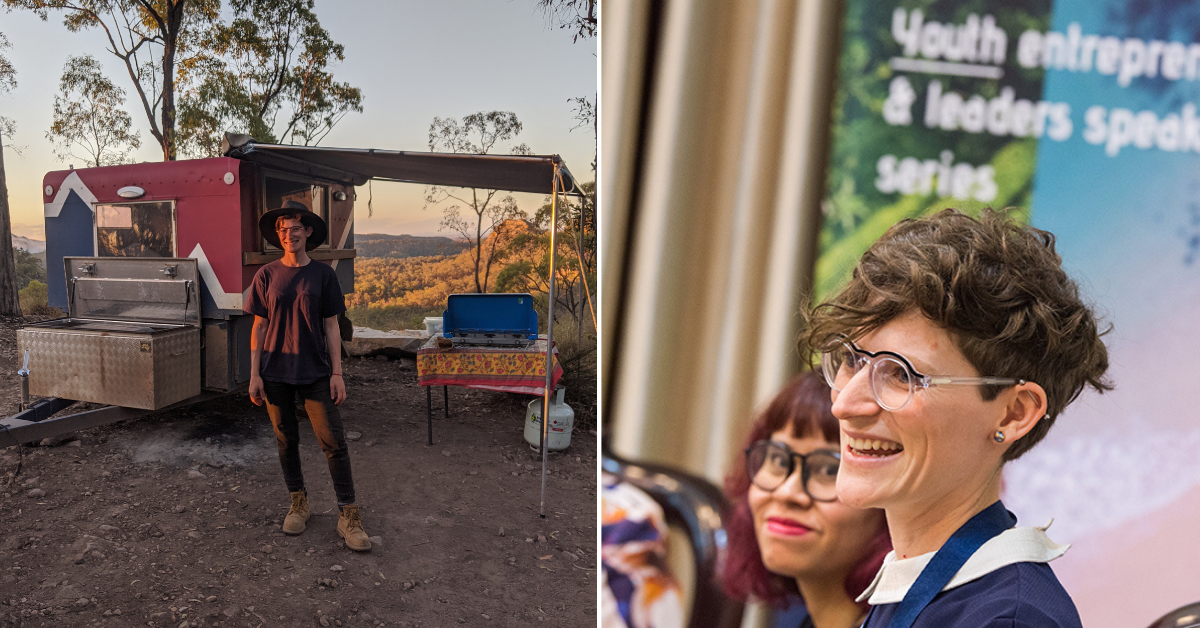
Finishing high school is daunting for a lot of people. Unless you’ve known exactly what you want to do with your life from the moment you were born, it can mean confusion over what your next step should be and potentially spending years feeling, well, lost. If that’s how you’re currently feeling, you’re not alone.
We’re here to tell you that choosing what to study based purely on the topics, issues, or subjects that catch your fancy is both a reasonable and sensible life plan. Particularly if you have no clear goal of where you want to end up (seriously though, do any of us?). Enter: Dr Elise Stephenson.
In her final year of high school, Elise had an accident that injured her hands, wrists, and arms, which meant she wasn’t even able to complete her final exams. It was this event — and the fact she could no longer pursue careers as a chef or photographer — that led Elise to study Asian and international studies, plus communications (and later, government and international relations), purely because she was interested in the topics.
Fast forward a few years, and Elise is now a post-doctoral research fellow at Griffith University’s Policy Innovation Hub, researching and advising on the best and most innovative ways to transform our society through policy.
Before she landed here, she also co-founded Social Good Outpost, a successful social enterprise and design and strategy studio across Australia and Asia all while undertaking her PhD. Oh, and spending up to six months of the year working in rural and regional Australia.
In fact, along with her partner, she built a travelling “tiny home” to work with communities on issues like mental health and gender equality. In their little home on wheels, they drove more than 75,000kms over the four or five years — that’s almost twice the circumference of the earth. And that’s not even all of it, but we’ll get into that a little later on.
PTV: You’ve already achieved so much in your career. Can you please tell me about your proudest achievement to date?
Dr Elise Stephenson: Being asked to lead a series of events as part of Australia’s biggest public diplomacy program, “Australia now”, across Southeast Asia at the age of 26-27 has to be one of my proudest achievements. One highlight was helping to organise the first open-to-the-public event on LGBTI+ (that we know of) in Laos, Southeast Asia.
I’ve also been fortunate enough to work with the Vietnamese government around domestic violence prevention, Cambodian human rights organisations around campaigning, and young entrepreneurs in Brunei driven to see social change in their communities… among many other amazing organisations and communities!
PTV: You have four degrees under your belt, so it’s clear that you see a lot of value in tertiary study. Can you please explain why you have gone back to study again and again, and how this has added to your career?
ES: When I first arrived at Griffith University, I learned very quickly that study allows [you to experience] so much growth (personally and professionally), which equipped me with the skills and confidence to pursue and create my own career. From a double degree to honours, and then my PhD, I felt really lucky to have studied at Griffith University.
Higher education equates not only with greater knowledge and expertise, but also greater credibility. This is pretty important in my field, and I think has been instrumental to all of the work I’ve been able to do on the world stage. Studying the PhD, for instance, enabled me to meet and work with all kinds of amazing people I wouldn’t have otherwise had the opportunity to work with. Some highlights throughout my studies include over 10 international studies, research or volunteering exchanges, plus interviewing our former Prime Minister, Julia Gillard, and former Foreign Minister, Julie Bishop, amongst hundreds of other incredible people leading on the world stage.
PTV: You’ve mentioned previously that imagining a future with no boundaries is important to you. Given how much uncertainty the whole world has faced and is still facing, it’s an encouraging concept to imagine this in our futures. How have you used this skill to help champion marginalised voices and unlock better futures for them?
ES: I’m a big believer in the concept of antifragility. Antifragility is a concept that goes beyond resilience or robustness, to describe things that gain from uncertainty and disorder.
It was pioneered by an American economist, Nassim Nicholas Taleb however, in my life, it has all kinds of applications: from embracing risk and uncertainty, to creating different options for yourself, and always building on your own capabilities and expertise. It’s a little bit like the idea that what doesn’t kill you only makes you stronger, except you actively embed uncertainty and experimentation in your life.
For anyone who’s ever dabbled in entrepreneurship, you’ll recognise how similar this is to starting your own business or adopting an entrepreneurial mindset. You are encouraged to dream big and transform failure into a quick learning curve. You’re also encouraged to take risks as, without them, a business can’t even exist at all.
This is primarily how I work with marginalised communities, whether through running entrepreneurship workshops for women, LGBTI+ across Southeast Asia, or with kids from the Eyre Peninsula in rural South Australia.
PTV: What was the most valuable piece of advice you took from interviewing 80 women for your PhD to explore women’s pathways to (and experiences of) leadership, within the context of international deployment and representation across foreign and defence affairs?
ES: I loved one of my interviewee’s advice in particular: paddle your own canoe. What she meant by that was, your life and your career really is your own responsibility. If you want to make it to the far side of the lake, you have to paddle there yourself, knowing you may come up against choppy waters and retreating tides as you go.
Further, whilst there may be many systemic barriers against your participation in this or that part of your career, there is also almost always a way around it, if you have the patience, persistence, and creativity to see it through.
PTV: What is your opinion on how young women and LGBTQIA youth specifically can get involved, and make an impact in, foreign policy and public diplomacy? And can you please speak to the importance that these two groups do get involved in the first place?
ES: There are so many important reasons why women, LGBTI+, and young people should be involved in foreign policy and international affairs. Firstly, we need better representation, which is an important part of living in an Australian democracy. Secondly, our international affairs need good ideas and it needs a lot of them. We know they won’t all come from the same place, so having a diversity of voices at the table allows us to draw on the perspectives, experiences and expertise of a wide range of society.
Thirdly, if you are a young person, woman, or LGBTI+ individual, then being part of determining the direction and influence of your nation in the world is an enormous privilege and responsibility. If you have a drive for making a difference and want to see phenomenal Australian leadership on the world stage, then don’t wait for it to change by itself — be part of creating it yourself.
In the last two years, I’ve [also] run just over 50 events with thousands of individuals across Southeast Asia . . . all with the aim of raising the voices of the next generation across our region and building collaborations that last as we tackle the big issues, from climate change to COVID-19 recovery and beyond. [So] come be part of our events!
There are many opportunities for getting involved, from joining university groups and networks to international affairs associations, events, and international careers. And remember, if you don’t see the ideal opportunity you want, create it for yourself, knowing there is a community of like-minded people out there who will support you in your endeavours!
If Elise’s story has inspired you to make an even bigger impact on the world, check out Griffith Uni’s new Bachelor of Business where you’ll learn all about things like entrepreneurial mindsets, diversity, sustainability and resilience. You can also choose one of 20 majors including Government and International Relations and Asian Studies, just like Elise did.



